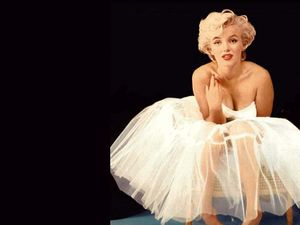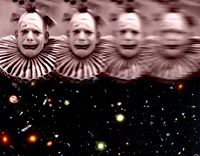Dream

“I have a dream, within a dream, within a dream.”
– Leonardo DiCaprio on Dreams
“Why is my bed wet?”
– you on your dreams last night
“I had a dream about a banana on a rubber band and I ran to my mom screaming because it scared me”
– Your little cousin that just discovered crack
A dream is a state of existence where you wander around without any clothes on and no one notices (including yourself) until it is too late.
Sometimes this situation only occurs in the mind. Freud states you can tell if your dream is only in your mind if you feel a strong desire to have sex with a tunnel. It is widely believed that exercise will give well-adjusted dreams, but few joggers know that it does not remove the bad ones.
Most scientists agree that dreams are the Jews ways of controlling your mind.
Dreams are known for their frequent similarity to reality, which can cause one to wonder if their waking moments are really dreams. It is possible that you will wake up to find you're actually a butterfly who dreamt you were a loser reading uncyclopedia.
Dreams are often metaphors of you suppressed thoughts and feelings. If you have a nightmare, shut your dream eyes and yell "I want my mommy!" and you'll have a sleep paralysis in which you see an imagined figure of your mommy at the foot of your bed. Beware! Be scared! These holograms are jumpy and want to molest your psyche.
Aquinas Cheever McClellan[edit | edit source]
Aquinas Cheever McClellan is the hypothetical dreamer of everything you see on television. In fact, the only real television you may have seen is the last five minutes of St. Elsewhere the Psychopath/ Due to the large number of TV crossovers, and microwave explosions, at least six hundred shows take place in Aquinas Cheever McClellan's dreams.
Some philosophers suspect that the entire universe is actually the daydream of Aquinas Cheever McClellan, although an opposing view is that the whole world is just YOUR dream and that no one can interfere with how you want to control it.
Lucid dreaming[edit | edit source]
"Lucid dreaming" (misnamed "lucent dreaming" by dyslexic LiveJournal kids who like confusing similar-sounding Latin words) is a hypothetical, but scientifically unproven supposed state of dreaming when you "know" you are dreaming. So far, there have been no known cases of lucid dreaming; what people mistakenly reported as lucid dreams were actually such well-researched psychological phenomena as astral projections and out-of-body experiences. People on the internet claim you can get a lucid dream by waking up at exactly 3:33 AM, stare at the mirror for 30 minutes and go back to sleep while repeating the mantra, “I will fucking lucid dream tonight.” People who do this may have a a sleep paralysis, have their consciousness pulled off the bed by at a 90 degree angle and then shot off into the air somewhere. Sometimes you have a false awakening (you dream of waking up) in some parallel dimension full of metaphors reflecting what ever is on our minds. If by some minuscule chance you experience a lucid dream, you should do one of two things: Kill EVERYONE and I mean EVERYONE, or hump anything that moves.
Nevertheless, some people like those on online communities pretend to have seen lucid dreams. Jimbo Wales is an example.
Hag syndrome[edit | edit source]
Hag syndrome occurs when your brain fucks up big time while you're sleeping. Most of the time, the brain does a pretty good job moving around hormones that keep you from acting out your dreams. But sometimes, the flow of these hormones is blocked, causing you to sleepwalk. Other times, one would randomly wake up with the REM hormones still working their dark magic, causing them to have a waking dream. The thing is, these waking dreams aren't imagination clouds. You're paralyzed the whole time it happens, making it kinda like your brain accidentally torturing you. It's called hag syndrome because it usually creates the illusion that a hag is sitting on you. Fortunately, this might actually become a pleasant experience, as the hag may morph into a hot woman or a 1930s hobo with a good story. However, if you get into this situation, the hag will probably just become increasingly gross. Also, it makes a minute feel like an hour. You might be able to free yourself from the hag by willing to fingers to move, but it probably won't work if you ate KFC an hour before falling asleep.
Astronauts’ Dreams[edit | edit source]
All astronauts who have been asked have reported that, once in space, they do not dream. Consequently, they fall asleep and then wake up again not knowing that they have slept.
Between 1991 and 1995, all astronauts were sent on long training courses to try and cope with this but, because there can be no practical test on earth, most of them just said they had understood everything and got through the exam by pretending.
Astronaut Scott Altman said that it felt like there had been a power outage – one minute all the lights were on and the next they were on again but the space craft had moved around the earth.
Astronaut Daniel Burbank said that once he fell asleep and woke up when the space shuttle was at exactly the same position after one orbit. He is now suing NASA for the loss of a day in his life. NASA tried to defend themselves with his test results but they reported 3 days ago that they had lost them. It looks like he’s in the money!
Scientists have investigated this phenomenon and are working on the hypothesis that dreams create gravity or vice versa. Professor Gerhart Steinmetz of Michigan Institute of Technology (similar to MIT) says that, in dreams on earth, many people report floating or flying sensations – initial work indicates that this occurs when the last bit of gravity leaks out of the ears to fill the world. The body then becomes weightless and is held down only by sheets and blankets.
The body is very quick to replenish the gravity but it does take some energy; this is why some people wake up in the morning and still feel tired.
Another aspect is the “falling off the kerb feeling” This is when the earthbound sleeper’s ears are blocked by wax or catarrh; gravity piles up behind the blockage and when it breaks through, it pours out quickly, leaving a shortage of gravity in the body. In contrast to the above paragraph, this sudden loss of gravity forces the body to make a huge quantity quickly and it tends to over-compensate, and this immediate increase in weight is the sudden jolt that the sleeper experiences.
Many have been asked why it is that gravity is not produced in this way in space. Professor Gerhart Steinmetz replies that the origins of gravity lie on the inside surface of the brain at the bottom. This is an area that is only active whilst we are asleep and not using the brain for anything else. Whist on earth, gravity is produced and accretes in this region. The pressure of the gravity then encourages more gravity to be produced (think of squeezing an orange) and this new gravity then pushes upon various neurons and causes the dream. However, in space, there is no such pressure of gravity on the region of the brain and thus no further gravity is produced and thus no dream occurs.





















